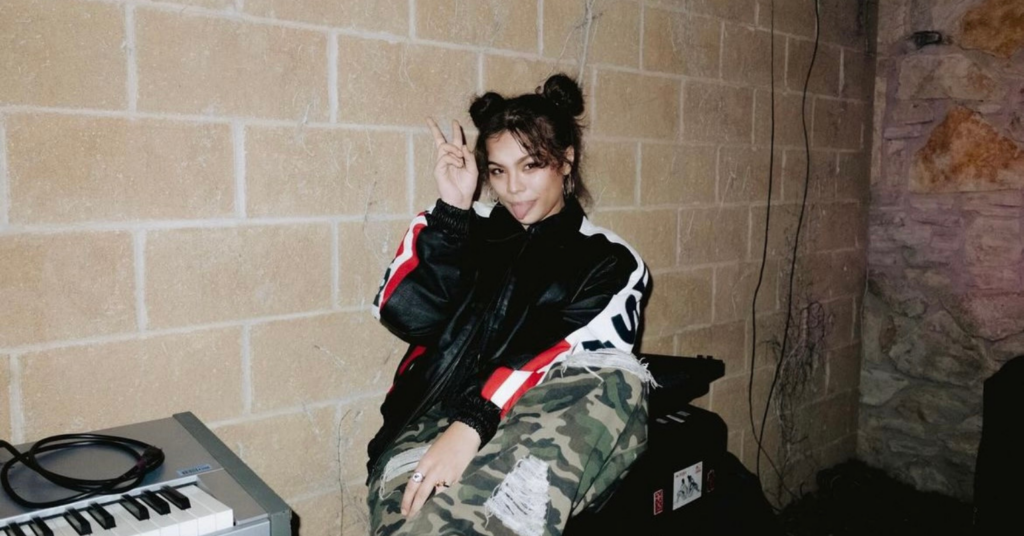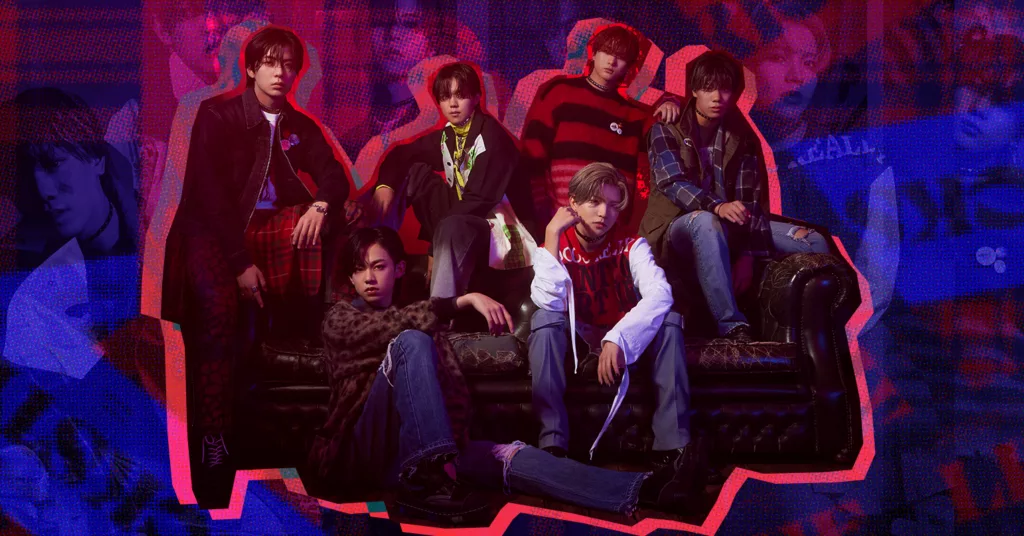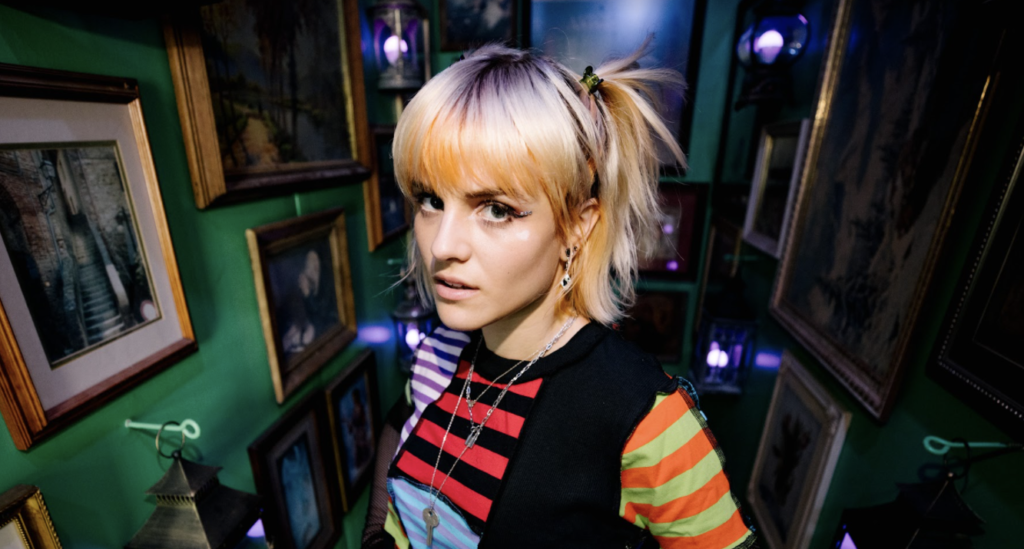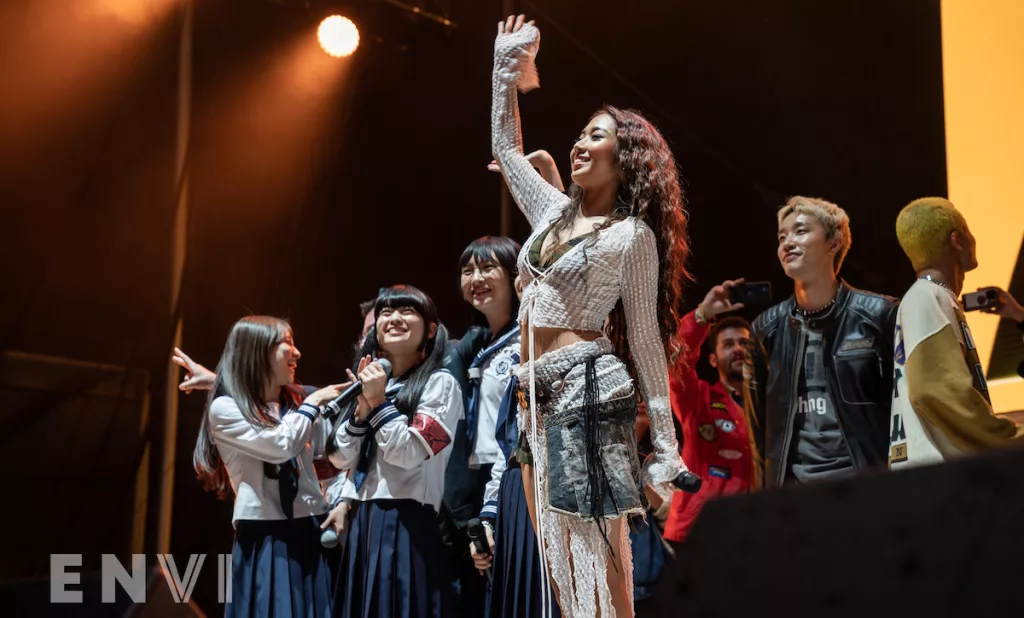Artist Spotlight: Hip-Hop Artist Majin Defines Herself

Last December, Majin, a hip-hop artist of Taiwanese and German descent, released her debut EP called 1Majin Nation. An English lyric from the punchy rap track “Same Title 狗血” stands out: “I’m that only one that believes in myself.” Majin (born Jo-Ann Ruff) spits line after line, weaving her pain, her anger, and her story into art.
“I was an angry rapper, you know, I hated the world,” she told EnVi during our chat a few months ago, lounging comfortably in a soft gray sweatshirt. She reflected on “Same Title 狗血” and her mindset when she wrote the adrenaline-flooded piece, saying, “I feel like a lot of people didn’t understand my pain.” 1Majin Nation’s third track was the artist’s response to those type of people and their unfounded — and unwelcome — judgements. It was a way to make it clear that “I can be angry, too,” she emphasized.
When EnVi spoke with Majin, it had been about a month since she had returned to Taipei following the Rap of China overseas competition in New York City. On March 2, Majin took home second place in this international audition after five months of battles and making it into the Top Six. As a result of her second-place award, Majin earned herself a spot to compete on the main stage of iQiyi’s hip-hop variety show, Rap of China.
Having grown up in countries like Taiwan, Germany, and Indonesia, Majin’s English is tinged with the stories of the places that raised her. Her simultaneous steadiness, energy, and openness are clear during our conversation. Like when she boldly said, “Ask me anything,” complete with wide open arms for emphasis.
In an office tucked in the bustling Taipei 101 area, EnVi sat down with Majin to talk about her songwriting process and how her multicultural heritage inspires her music.
Introducing Majin
To begin to understand Majin’s music is to understand her multiculturalism. Born to a Taiwanese mother and a German father, Majin spent her early years growing up in Taiwan. She revealed that Taiwanese people didn’t really get who she was as a biracial person. However, she also faced racism when she lived in Germany during her teenage years. Indonesia, meanwhile, was a kind of happy place for the burgeoning hip-hop artist and a country she looks back on very fondly — even today.
Majin immediately recommended people listen to her 2023 track “Alexis.” Not only was it her first single in (mostly) English, but “I have a flow of my own,” she stated proudly. “I’ve always hated being the same as other people. When I was little, I always wanted to be that different kid,” Majin added.
While Majin said that she wanted to be a “different kid,” she was also treated differently when she was growing up. Eventually, she realized that being different doesn’t have to be a bad thing. “I’m gonna make this identity,” Majin stated firmly, about the new mindset she had when she was younger. “I’m gonna be different.”
This is what “Alexis” is all about. The music video is a reflection of the track and its honest lines such as “I’ve been trying to build my way to the next level / playing with my words like Lego.” “Alexis” is mainly set in a local market — where she causes mischief and fools around with friends — because these streets were something Majin was very familiar with. People of various multicultural backgrounds and heritages also appear in the music video, a decision that was, again, inspired by Majin’s growing up experience. She said of this choice, “I grew up with so many different people.”
They also, as Majin emphasized, “taught [her] so much,” about life in general and about music. “I have gotten my reggaeton and Afrobeats because I have hung out with the Latinos but also my other language skills from hanging out with the Germans and knowing the Indonesian [people],” she added. (Majin speaks three languages fluently — Mandarin, German, and English — but is also learning Spanish.)
“I would say I’m just [a] hip-hop artist,” she said when asked how she would describe herself to new listeners. Her perspective on hip-hop music (and her music, as a result) mainly comes from growing up in Europe as a biracial Asian person. People in Europe, like in Germany, saw her only as “Asian,” while people in Asia often saw her only as white. “I never really felt [like] I belong[ed] anywhere,” Majin admitted.
But hip-hop changed that for her. “The first time I ever [felt like I] really belong[ed] was when I started making hip-hop music,” she revealed. Thus, Indonesia holds a special place in Majin’s heart — because of music. She “fell in love with music in Indonesia.” And there is more to the story: “What I love about hip-hop music is you write it yourself, you create it yourself,” Majin explained. “You don’t sing other people’s songs, and I’ve always liked expressing myself.”
“I think Majin the rapper, or the hip-hop artist, is really somebody that she needed,” the “she” being Majin’s younger self. The artist herself continued with conviction, saying, “I want to be a voice for people, and that’s why I make music.”
Becoming the Artist She Is Today
Majin is full of stories — from stories about her experiences living in different countries to stories about the very first song she wrote. So, of course, there is a story about how “Majin” became Majin’s stage name.
It boils down to creating. “It’s a gift that God gave me, because whenever I’m creating, I feel like it’s a spirit talking to me,” Majin revealed. The word “majin” is also “Japanese [for] when a spirit and a person combine together,” she added — a magical person. That is how it feels when she is creating and sharing her music with others. As Majin further explained, “Somehow, no matter how nervous I am down here, when I’m up there [on] stage, [I] always know what to do.”
But this is not the only reason. When Majin was younger, she didn’t have many friends. So, she and her sisters cultivated their imaginations. “My mom has always said I’m a kid just full of confidence and imagination and nothing else. So imagination has always been a very special word for me,” Majin told EnVi. “I feel like I’ve gotten…everything that I’ve had from imagination.” And, thus, “Majin” was born.
However, Majin’s artistic journey starts with her life journey. During our interview in Taipei, she began her story from the very beginning. With nothing but honesty in her voice, she stated, “I wasn’t really [a] happy kid when I was living in Taiwan.” Although her mother is Taiwanese, people still judged Majin because of how she looked to them. To do this day, she remembers the discrimination she faced for looking more racially ambiguous in Taiwan. “You cannot be in a group…because you’re white and stuff,” is something Majin remembers from when she was in school, for example.
“That kind of hurt me as a kid,” Majin said. “I was already facing the loss of identity [at] a very, very young age.” But she also questioned, “So why should I be like them?”
Majin pointed to moving to Indonesia and attending an international school as a critical turning point for her. “Everybody was just as special as you,” she noted. The hip-hop artist also remembers DJ-ing and going to nightclubs. But when this got a little too out of control, Majin’s parents sent her (now a 16 year old) to Munich, Germany. “That’s when I faced the lowest of my life,” she revealed along with mentioning how those feelings of abandonment still linger a bit now.
Once Majin was in Germany, she stood out again as the only Asian person in her all-white school. She faced racism, even though she spoke “perfect German.” People also could not — or refused to — understand that she was from Taiwan, not Thailand or the Philippines. “I started to hang [out[ on the streets more, which also actually made me hip-hop because…I just didn’t want to learn what the school want[ed] to teach me,” Majin said. “So instead, I started hanging out with all the other people who weren’t accepted.”
Yet, Majin was still in a “very low place” during those years, especially since COVID-19 hit. “The only thing that was with me was music,” she said matter-of-factly. Music was her lifeline — and she knew this was what she wanted. “The only thing I want to do is music,” Majin said, speaking of her mindset then. “So you know what, even if I’m not gonna make it, I’m gonna give it a shot.”
With musical inspirations and role models such as Rihanna and Amy Winehouse guiding Majin on this path, she dedicated herself fully to her craft. In two years, Majin wrote about 50 songs and began posting clips of them on Instagram. As a result, the budding musician started getting noticed in Taiwan.
But she continued to struggle in school and had to redo her grade again. It was at this point when Majin gave her parents an ultimatum: ““Look, either I die right here, or you give me one year to go back to Taiwan. And then we’ll see if I get signed within one year, then that means I’ve got something,” she repeated to us years after the original conversation. “But if I don’t, then I’ll come back.”
However, Majin was actually ready to pack her bags for Germany by the time the 10th month rolled around. She noted that she was still considered a “foreign person” to those in Taiwan. She was someone who “never made anybody feel relatable” when “relatable” was what the music industry was looking for.
大嘻哈時代2 The Rappers 2 was Majin’s big break. “That’s when I finally proved myself,” she stated. (Plus, her parents were proud of her, too.) “But before those two years,” Majin added. “I’[d] had the worst 10 years.” She concluded, saying, “My only best friend was music, and so it brought me [to] where I am today.”
The Process Behind Making Music
“I have a lot of stories,” said Majin. “That’s why I can write a lot, I can create a lot, because I feel like as an artist, you need stories to share.” Life is a significant source of inspiration for her music: the things she’s experienced, the places she’s lived, the people she’s met. It’s “all taught me so much,” she added. Majin also emphasized, “If you have never experienced anything…then you don’t have a story.”
For the hip-hop artist, it’s not just the good times that are sources of inspiration. Rather, the “bad times” form the crux of the music she admires and the type of music she writes. “I only write about real stuff,” she stated, referring to music by the likes of Eminem and J. Cole which “saved [her] life.” To create something from the “real stuff,” Majin also noted, “I appreciate all the bad times that I had.” She continued, “I don’t want to hear about how good you’re living, but I want to hear about how I can relate to the mistakes you’ve made.”
As for her writing process? “It just comes from my brain,” Majin responded with a laugh. Her ability to write songs was a skill that gave her an edge while she was competing on the overseas part of Rap of China. Making an Afrobeats track was the challenge, so Majin whipped out tropical soul for her submission.
“When I was at my lowest point, I was writing songs every single day. I was writing one song a day, including producing it, including recording and mixing it because [I] was my own producer,” she added. Majin’s songwriting process is “mostly freestyle,” in her own words. First, she freestyles over a beat to find the melody. This melody that emerges gives her an idea of what the song will be about.
“I never know what I’m gonna write about until I’m already writing it,” Majin said honestly. “When I choose beats, I don’t listen to them. I download them first,” she also mentioned while talking about her free-flowing process. Regardless of whether the beats become something more or not at that time, Majin keeps everything she works on. It just might not be the right time, she stated. “Every song is my baby, like my own child,” the hip-hop artist added with a big smile. “If I make one song, then this song has to be heard, and if it’s not going to be heard now, it will be heard one day.”
Majin wrote her very first song when she was six years old. “I’ve always had only one dream: that was becoming a star, an artist,” she emphasized. Even when she was little, she would pretend to be different kinds of artists with her sisters. The day that Majin wrote her own song (“I remember that day so well,” she said), one of her sisters was a model; another was a dancer; while Majin claimed the singer role. But, they realized they didn’t have a song to sing — after all, how can someone be a singer if they don’t have a song? So, six-year-old Majin made one in Chinese, a song she titled “Love.” (A now much older Majin even sang it to us!)
“I remember how to sing it because that was my first time ever,” Majin noted. It was also when she realized that she could write songs, if she wanted to.
Writing her first rap, however, was a different story. Rather than expressing the love of a six year old, Majin poured out feelings of heartbreak when she was 13 years old. “I wrote this whole letter, and I was gonna make it [into] a song. But I [was] too angry to think of a melody,” she revealed. Majin had no beat and no music around her — only her voice. “I just started having my own flow, having my own tempo in my brain.”
Friends who heard her rap encouraged to keep making music and to record her songs. “I wanted to [create music], and then one day, I realized I could [do] it,” said Majin. “It’s really fun creating because every time, it’s a challenge,” she added. “I love doing different styles, different genres because it makes me feel like it’s a game.”
As someone whose motto is “only do what you want to do,” Majin’s music-making process also reflects this idea. “I like having fun with what I do,” she emphasized. “Because I hate forcing myself to do anything. So everything that I’ve done in my life right now are the things I really want to do.”
Majin Refuses to Be Defined
Although Majin made it to China for Rap of China, she was eliminated after her battle in episode three. But as she told us months earlier, it’s not winning that matters most to her. “To me, what’s important is now more and more people can hear my music,” she said, and the same goes for her Rap of China journey.
In her Instagram post featuring a screenshot of herself from the show, Majin celebrates what she had accomplished, regardless of the final outcome. She got to share “Alexis” on a global stage, and the experience made her “很很很開心,” meaning “very, very, very happy.” Majin closed her caption in English, writing, “New things coming.”
As we began to wrap up our hour-long conversation, EnVi asked Majin, “What pushes you forward?” Majin answered with her characteristic honesty, “Last year I had a little bit of a burnout because for [a] newcomer, I was dealing with a lot.” She has only been part of the music industry for about two years now, but rising quickly comes with its challenges. “People don’t treat you like [you’re new] because when you’re doing good…people just think… ‘You need to do good because you’re good,’” she said. There are high expectations to deliver but oftentimes little appreciation and celebration come with that pressure.
Majin also revealed one of her biggest fears: “When people say my music is not good, that to me, it hurts more than [anything].” She brushes off any baseless attacks on her looks with ease (“B*tch, I’m beautiful” is her response), but her music is her baby. “I really had to learn to accept the fact that not everybody’s gonna like you,” she admitted.
However, even if there are some people who call her music “not good,” Majin has her support system. She gives a shout out to her boyfriend — who is also competing on Rap of China — and his unwavering support. “He [was] my biggest fan when nobody was supporting me. He’s just there for me,” Majin said with a smile. “I feel like love is what has pushed me to love…because I [was] always the person who really needed love, you know?”
Love also underscores her answer to our last question, “When do you feel most at home?” For Majin, “Home was wherever my heart was.” It was difficult to plant roots and make friends as a result of moving around frequently. But, Majin herself and her music have always been her home.
“Home is wherever I go,” she said. “And if people want to stay in my home, that’s their choice.” From the way Majin spoke about “home,” it was clear that she had thought about this and what “home” means to her. Home doesn’t need to be a specific place or a certain country; instead, Majin created her own definition of “home.” “I like defining things myself. And once I do define it, I believe in [it] more than anything, and nobody can change my mind,” she emphasized.
But for the people who have tried to define her for her entire life — with predictable questions like “Where are you from?” and “What are you?” — Majin has a few choice words for them. She asserted, “Nothing can define me.”
“I feel like a lot of people are really trying to tell me what an artist should look like, or what [an] artist should talk about or how an artist should act,” the hip-hop artist continued, her words flowing out quickly yet confidently. “And guess what, I’m not changing and then people are mad about it.” Majin continued, “I feel like I’ve gotten my confidence [from] the people who decide not to change…That’s why I believed in myself.”
However, sometimes society’s pressure is too strong. Instead of holding fast to who they are, some people do change and contort into something society is telling them to be. “The little kids kind of look at that and [are] like “Oh, am I not beautiful? Am I not lovable just because I don’t look like that?’” Majin added, touching on outside pressure’s impact on young people. “You lose all the value of being an artist once you change what you are because the meaning of being an artist is really to represent what you are.”
Majin believes that she can be that somebody — that role model — for someone who needs it the most. “I feel like I’m the image that especially Asian kids need,” she said. Kids who “aren’t [always] accepted into society” show this to her. They say that she gives them “so much confidence” and that she is “the reason why [they’re] confident.”
“That’s the reason why I do music,” Majin firmly concluded.
Keep up with Majin and her music on Spotify, Instagram, and YouTube.
Want to learn more about rising Taiwanese artists? Check out EnVi’s Artist Spotlight with Dena here!



